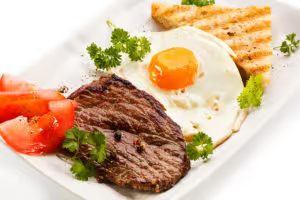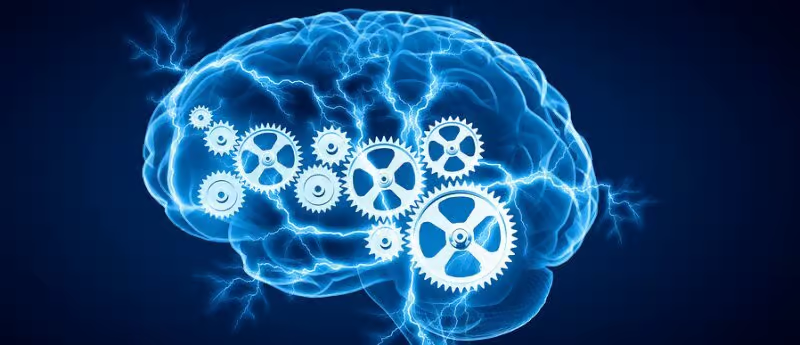Table of Contents
Phosphatidylcholine (PC, or Ptd-Cho) is one of two fatty acids that make up the outer layer of the membrane covering each of the 70 trillion cells in your body.
Phosphatidylcholine is also converted in your body through a process called hydrolysis to make up the fatty acids AA, oleic, linoleic, linolenic, and DHA. These fatty acids contribute to the signaling within and between brain cells for long-term potentiation (LTP). LTP is behind the formation of long-term memories.
The synthesis of the neurotransmitter acetylcholine (ACh) is largely dependent on the choline provided by Phosphatidylcholine. ACh is critical for cognition, learning and memory.
When you don’t have enough Phosphatidylcholine, brain cell membranes lose integrity and eventually die.
Some Phosphatidylcholine (PC) is naturally synthesized in your body. We also get PC from some of our food including beef, oysters, eggs and some vegetables. As a nootropic supplement, Phosphatidylcholine is derived from lecithin found in soybeans and sunflower seeds.
Note that lecithin and Phosphatidylcholine are NOT the same thing. Plain lecithin is not an efficient source of Phosphatidylcholine or choline. As a nootropic, look for as pure of a source of Phosphatidylcholine (PC) as you can afford.
Phosphatidylcholine helps:
- Neuroprotection: Phosphatidylcholine (PC) is a major component of brain cell membranes. And neurons use some of this choline to synthesize acetylcholine (ACh). Supplementing with PC restores the PC that is needed for brain cell membrane integrity. While providing neurons with the ACh needed for memory and learning.
- Neurotransmitters: Phosphatidylcholine increases concentrations of choline and acetylcholine in the brain. Improving memory and cognition.
- Neurogenesis: Phosphatidylcholine helps restore damaged brain cells. Making them more fluid and permeable allows the proper flow of chemical messengers and nutrients into and out of the cell. And improving overall cell function and efficiency. Resulting in better cognition, learning, memory, and mood.
Overview
Phosphatidylcholine (PC, or Ptd-Cho) is a phospholipid that plays a critical role in every cell in your body. Including your brain.

Your brain cells are each encased in a membrane. This bi-lipid layer of two fatty acid tails face each other. The outer layer of each cell contains mostly the phospholipids phosphatidylcholine (PC) and sphingomyelin, while the inner layer contains predominantly phosphatidylserine (PS), phosphatidylinositol, and phosphatidylethanolamine.
The outer layer of each cell membrane is highly permeable. But the inner layer is much less permeable. These two fatty acid tails are in a constant state of movement, vibrating at millions of times a second. This continual vibration could be considered the ‘backbone of life’. And is the basis of everything that happens in your brain.
The amount and type of long-chain fatty acids in your diet affects the composition of these cell membranes. The structure and function of your cells depend on the ideal balance of fats including cholesterol, oleic, palmitic and stearic fatty acids. And essential fatty acids like Omega 3. Without this proper balance, cell membrane function is compromised.
And you can be sure that our modern diet does not provide the ideal balance of fatty acids (phospholipids) to maintain brain cell integrity. It’s why you experience brain fog, memory loss, slow thinking and poor decision making.
Some progressive health care researchers and practitioners have found that supplementing with phosphatidylcholine (PC) can lessen the symptoms of diseases like MS, diabetes, immune system problems, asthma, and neurodegenerative diseases like Alzheimer’s.
You naturally get phosphatidylcholine (PC) from foods such as beef, eggs, oysters, broccoli and brussel sprouts. Supplemental phosphatidylcholine (PC) is made from lecithin found in soybeans and sunflower seeds.
Phosphatidylcholine (PC) maintains the integrity of brain cell membranes. And is directly involved in acetylcholine (ACh) synthesis. ACh is needed for cognition, learning and memory formation.
How does Phosphatidylcholine work in the Brain?
Phosphatidylcholine boosts brain health and function in several ways. But two in particular stand out.
- Phosphatidylcholine is needed for long-term memory. The hydrolysis of Phosphatidylcholine (by a process called phospholipase A2-catalyzed hydrolysis) is used to make the free fatty acids AA, oleic, linoleic, linolenic and DHA.
These free fatty acids facilitate synaptic transmission by targeting nicotinic ACh receptors using protein kinase C (PKC). This messenger system is needed for long-term potentiation (LTP). Researchers have determined that these fatty acids are critical for learning and memory.[i]
- Phosphatidylcholine helps repair neurons. Cholinergic neurons are unique among cells because they serve two functions. PC is a major component of brain cell membranes. And serves as a storage pool for the choline needed as a precursor for acetylcholine (ACh) synthesis.
Researchers demonstrated how this works. They incubated human cholinergic cells in the lab. And followed the metabolic link between membrane composition and turnover, and ACh synthesis. And proved that ACh is synthesized from choline derived from the degradation of Phosphatidylcholine.
If there is not enough choline available to maintain brain cell membrane integrity, and to synthesize the neurotransmitter acetylcholine, brain cell function breaks down. You experience brain fog, poor memory and decision making. And ultimately leading to neurodegenerative diseases like Alzheimer’s, and other motor neuron disorders.[ii]
How things go bad
As you get older, your brain chemistry and energy metabolism changes. This can happen at any age once you enter your adult years. Low Phosphatidylcholine levels have even been found in newborn babies.
↓ Brain cell membranes degenerate
↓ Recall, reaction time and mood diminish
↓ Acetylcholine levels decline
All of these changes can happen at any age. Your body is influenced by the food you eat, what you drink, lifestyle habits, the air you breathe and more.
So Phosphatidylcholine can help for age-related cognitive decline, as well as a student looking to do better in school.
Phosphatidylcholine benefits
Phosphatidylcholine (PC) has been around as long as humans have walked this planet. PC is a critical component of the top layer of the membrane surrounding each one of the cells in your body.
And yet some are talking about Phosphatidylcholine as the “New Wonder Drug”. How could this be? Turns out that PC is a fatty acid. As are many of the fats you consume in your modern diet.
Long-chain fatty acids affect the composition of your cell membranes. When you eat bad fats your cell membrane fluidity is affected, ion channels disrupted, hormones, regulation of neuroreceptors, signaling and other signaling chemicals are affected.
Incorrect amounts or types of long chain fatty acids can lead to a cascade of serious health and cognition problems.
The easiest and simplest way to correct many of these cognition problems is to supplement with Phosphatidylcholine as a nootropic. You’ll feel better as cells are repaired. Digestion issues could be eliminated or minimized. And brain fog, cognition and memory problems could become a non-issue.
How does Phosphatidylcholine feel?
If you eat a perfectly healthy diet and are in optimal physical and mental health, using Phosphatidylcholine may not do anything for you.
But if you’re like most in the Western world relying on fast food, processed food and other unhealthy lifestyle habits, then PC may help.
Neurohackers report that supplementing with Phosphatidylcholine lifts brain fog, improves working memory and boosts alertness.
Others say it helps them prevent anxiety and panic attacks. Mental clarity is improved, and energy levels rise.
Ray Kurzweil, the famous inventor and futurist, gets phosphatidylcholine intravenously once a week at his health clinic. His theory is that this will rejuvenate all his body’s tissues.[iii]
Phosphatidylcholine Clinical Research
A double-blind study in California with 80 college students investigated the effect of Phosphatidylcholine on memory. The students received a placebo or either 10 or 25 grams of Phosphatidylcholine (PC). 25 grams of PC was estimated to supply about 3.75 grams of choline.
Memory was tested at 60 and 90 minutes after taking PC. The researchers recorded a significant improvement in memory after 90 minutes, and only a slight improvement after 60 minutes.
This 1993 study was the first to test the relationship between a single dose of Phosphatidylcholine on memory in healthy human subjects.[iv]
Phosphatidylcholine Prevents Brain Cell Death
Streptococcus pneumonia is the most common cause of bacterial meningitis. And is the most common cause of death from pneumonia. If it doesn’t kill you, it can cause paralysis, mental retardation and learning disorders.
In humans, it’s your hippocampus neurons that are the first to die as a result of meningitis. Cell death is officially called “apoptosis”. But I’m using cell death to drive a point home.
Phosphatidylcholine (PC) is an essential component of your cell membranes. And a deficiency of PC, either from chemicals, disease, or bad nutrition leads to cell death. And the first to go are your hippocampal neurons. The same neurons used for learning and memory.
Researchers in Tennessee found that a variety of brain cells die after you get pneumonia. Because it interferes with Phosphatidylcholine synthesis. And apoptosis inhibitors can’t even stop this cell death from happening.
The research team determined that the only way to prevent cell death from pneumonia infection was supplementing with Phosphatidylcholine. Even after the infection set in.
The researchers concluded that supplementing with Phosphatidylcholine was the best way to prevent what they called an “apoptotic cascade”. And the best therapeutic intervention.[v]
Phosphatidylcholine Improves Memory
Studies on the effect of Phosphatidylcholine on memory are limited. So researchers in Japan decided to remedy this lack of data by testing PC in mice with dementia.
They administered PC to mice with dementia and to normal mice. And compared differences in memory, choline and acetylcholine concentration, and choline acetyltransferase (ChAT) activity. ChAT is the enzyme responsible for the synthesis of acetylcholine in the brain.
The researchers found that giving phosphatidylcholine for 45 days to mice with dementia improved memory. And generally increased brain choline and acetylcholine concentrations to or above the levels of the normal control mice.
The research team concluded that phosphatidylcholine increases brain acetylcholine concentration and improves memory.[vi]
Phosphatidylcholine recommended dosage
Recommended Phosphatidylcholine dosage is 1,200 mg to 5 grams per day. And divide your total daily dose into 2 or 3 equal doses and dosed throughout the day.
To enhance bioavailability and boost absorption, take PC 30 with a meal or tablespoon of unrefined coconut oil or extra virgin olive oil.
Do not take Phosphatidylcholine with acetylcholinesterase (AChE) inhibitors since this combination may excessively increase acetylcholine (ACh) levels and potentially cause cholinergic side effects. AChE inhibitors include donepezil (Aricept), Tacrine (Cognex), rivastigmine (Exelon) and Huperzine-A.
Phosphatidylcholine Side Effects
Phosphatidylcholine is naturally produced in your body and is considered well tolerated and safe. PC is not toxic.
Some may experience sweating, stomach upset and diarrhea. Particularly if you’re already high in choline.
Type of Phosphatidylcholine to buy
Phosphatidylcholine is sold in tablet, capsule, liquid and powder form. Capsules can run from 420 – 1,300 mg each. 500 mg of Phosphatidylcholine in powder form is equivalent to 2-level 1/8 tsp scoops.
Phosphatidylcholine is sometimes used interchangeably with “lecithin” which is misleading and simply not accurate. Choline is a component of phosphatidylcholine, and is also found in very small amounts in plain lecithin. Although closely related, these terms are not the same.
You will experience the nootropic benefits by supplementing with Phosphatidylcholine but not with lecithin.
Nootropics Expert Recommendation
Phosphatidylcholine 1,200 mg to 5 grams per day
 I recommend using Phosphatidylcholine (PC) as a nootropic supplement.
I recommend using Phosphatidylcholine (PC) as a nootropic supplement.
Phosphatidylcholine helps build and repair cell membranes. And is found in every one of the 70 trillion cells in your body.
You can get Phosphatidylcholine from some of the food you eat. But Phosphatidylcholine is only found in foods like beef, eggs, oysters and some vegetables. PC levels decline as you age and you are unlikely to get nearly enough through diet. So to get its benefits you must take it as a nootropic supplement.
Phosphatidylcholine is vital to maintaining optimal brain health. And has been shown to increase cognitive energy, boost brain function, enhance communication between neurons, and protect neural membranes from free radical damage.
I suggest starting with a dose of at least 1,200 mg daily. Phosphatidylcholine is a great compliment to a stack including any nootropic from the racetam-family. Anything that causes an increase in uptake of acetylcholine in your brain.
You need to provide your brain with the choline it is demanding. Or it starts cannibalizing your own brain cells to make more acetylcholine. Signs that you’re lacking adequate choline or acetylcholine are headaches.
Use Phosphatidylcholine at a ratio of 1:4. For example, 250 mg of Phosphatidylcholine to 1,000 mg of Aniracetam.
If you have liver damage like cirrhosis, you may want to increase the dose up to 4.6 grams per day for liver repair.








Join The Discussion - 141 comments
Joseph
September 7, 2024
Can you take this with alpha gpc and cholone or no?
David Tomen
September 7, 2024
You can with Alpha GPC but there is no need with CDP-Choline because it helps to produce Phosphatidylcholine.
Joseph
September 7, 2024
Thank you for that. Any thoughts on cistanche? I like it. I got one from teraputics
David Tomen
September 8, 2024
Joseph I think it is on my “to do” list but I haven’t gotten to it yet. Here is a clinical study that tries to make sense of how Cistanche works in the brain: https://www.ncbi.nlm.nih.gov/pmc/articles/PMC5028387/
sander
May 22, 2024
David, thanks for the valuable information. Do you think I can also take PC with dinner (I already take it with breakfast and lunch) or could it make me very agitated and disrupt my sleep? I want to split the dose, but I have this fear. Thanks.
David Tomen
May 23, 2024
Sander, unless you are treating a specific disease like liver problems you only need max. 1,200 mg PC per day. And it is best to take it at least a half hour before food or you may not get PC’s full benefit. You don’t need another dose late in the day.
sander
May 24, 2024
Thanks a lot, David!
sander
May 24, 2024
David, just one more question about the point “To enhance bioavailability and boost absorption, take PC 30 minutes before a meal.” As English is not my native language, I can sometimes get confused. So do we have to take PC on an empty stomach, half an hour before meals (like amino acids, for example) or should we take it with some type of fat?
Again, thank you very much.
David Tomen
June 3, 2024
Sander, Phosphatidylcholine is fat soluble to you need a high quality fat or oil to make sure it is absorbed. I should likely delete that sentence because it could be confusing even to anyone.
patt lennon
May 7, 2024
can you take cdp-choline and pc together?
David Tomen
May 7, 2024
You could but it is not necessary to use both. Use one or the other.
patt
May 7, 2024
i am taking thorne Phosphatidyl Choline derived from soy. I would like to find one from sunflower but everthing I see online is sunflower Lecithin. can you suggest a brand of PC that extracts from sunflower and not soy?
David Tomen
May 8, 2024
Patt, they label it as Sunflower Lecithin but the amount of PC is declared on the Supplement Facts label: https://geni.us/I1nmwcR (Amazon)
patt lennon
May 9, 2024
thank you,
Ben
November 9, 2024
Optimal PC by Seeking Health
BodyBio PC by Body Bio
Sveta
April 27, 2024
Hello David, I take Advanced Milk Thistle supplement (Silybin with Phosphatidylcholine) for NAFLD. They are brown capsules (soft but the type that you can’t open). Can’t find any info how to take them -with or without food. Can you please advise?
David Tomen
May 8, 2024
They need to be taken with food which includes a healthy oil or fat. Or with a tablespoon of unrefined coconut oil. Because Milk Thistle is fat soluble.